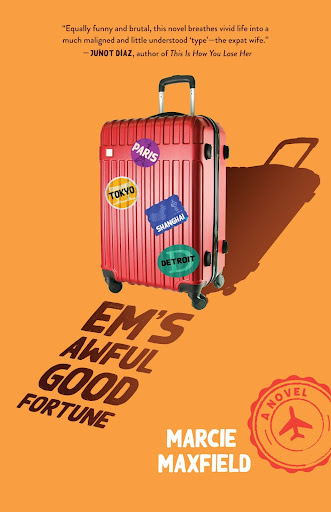Em’s Awful Good Fortune aims to challenge societal expectations
 LOS ANGELES, CA – Marcie Maxfield debuts as a novelist with her raw exploration of the expatriate journey,
not just through various countries, but through the personal road to self discovery.
LOS ANGELES, CA – Marcie Maxfield debuts as a novelist with her raw exploration of the expatriate journey,
not just through various countries, but through the personal road to self discovery.
What was originally meant as a memoir turned into the autofiction feminist statement Em’s Awful Good Fortune (She Writes Press, August 3, 2021). Maxfield’s novel is a biting comedy about a woman’s global journey to reclaim her autonomy in a relationship stretched by the unfamiliar landscape of expat life.
Part dysfunctional marriage, part global romp, Em’s Awful Good Fortune is not your typical expat story. The book is a deeply personal, marriage coming-apart-at-the-seams look at the struggle between a woman’s desire for partnership and her need for identity. Fueled by twin demons, love and rage, Em stomps her way around the world coming to terms with the fantasy of having it all: husband, kids, and a career. Em is not just married; it’s more like being handcuffed to her husband’s international career. Her life reads like a fantasy, bouncing between Los Angeles, Paris, Tokyo, Shanghai, and Seoul. But—the good fortune is all her husband’s: Em is just the tagalong wife.
Maxfield’s compelling, non-linear story explores the expat lifestyle through the lens of a struggling marriage, while at the same time tracing the lasting impact of sexual assault and PTSD. Em’s journey exposes the dark corners of this seemingly privileged world: loneliness, depression, infidelity, and loss of career. A whip-smart empowering narrative about compromise that every woman should read. Em begins to value her needs before those of her husband’s career, she stops letting herself be dragged along for the ride—and ultimately emerges triumphant.
“Em’s Awful Good Fortune”
Marcie Maxfield | August 3, 2021 | She Writes Press | Literary Fiction
Paperback | 978-1647421427 | Ebook | B08QZ58FDC
Praise for the book
“Maxfield calls Em’s problems those of ‘tagalong wife privilege,’ but the novel isn’t just about that; there’s something here that’s more universal, which women in different circumstances are sure to find familiar: the notion of abandoning the care of one’s own health and happiness in the name of love of family and marriage.” – Kirkus Reviews
“Settled in, but not settled down, Maxfield’s Em is the feminist response to Dangerfield’s “I don’t get no respect”. A character you want to meet in a lost bar in a lost town and spend the evening laughing with. Ironic, poignant and downright funny. It is a great novel to take on the road….” – Andrew Fierberg, producer of Secretary, My Art
“Em’s Awful Good Fortune brilliantly skewers the rarified life of the overly precious “tagalong” ex-pat life. The novel reads like your best friend’s blisteringly funny diary, especially if your best friend happens to be a stand-up comic with a knife’s edge wit who can make mince-meat out of any philandering husband. . . Find a chair, open the first page of this sizzling story, and fly around the world on that trip you’ve been itching to take all year.” – Susan Conley, Author of Landslide and The Foremost Good Fortune
“Equally funny and brutal, this novel breathes vivid life into a much maligned and little understood ‘type’ – the expat wife. Maxfield poured her heart into the writing and it shows: the pages crackle.” – Junot DIaz, author of the New York Times bestseller This is How You Lose Her and the Pulitzer Prize-winning The Brief Wondrous Life of Oscar Wao
“This breathless memoir of a woman’s attempt at balancing love with self-love as she navigates the joys and pitfalls of the tagalong life will keep you reading until the wee hours, and might even change the way you view marriage, travel, and feminism.” – Corine Gantz, author of Hidden in Paris and the trilogy: The Curator of Broken Things
“A fast-paced, blink-and-you’ll-miss-it whirlwind of a book capturing the good, the bad and the ugly of being a ‘tagalong’ expat wife.” – Stephanie Suga Chen, author Travails of a Trailing Spouse and Disunited Nations: International School Mums at War
“Any woman who has ever sacrificed something of herself for her family will empathise with the good fortune that comes with a hidden cost.” – Jo Furniss, author of The Trailing Spouse, The Last to Know and All the Little Children
More about Marcie Maxfield
 Marcie Maxfield’s voice is fierce, authentic and personal. Her debut novel, Em’s Awful Good Fortune, is based on her experiences living overseas as a tagalong wife. Her play Girls Together Always—a collection of coming-of-age stories about “growing up girl”—won the ENCORE! Producer’s Award at the Hollywood Fringe Festival. Maxfield is a teen mentor and volunteer for WriteGirl—an L.A. organization dedicated to empowering girls through creativity. She is married with two kids, a French bulldog named Bader, and two rescue cats named Hunky and Dory. They live in Los Angeles, CA.
Marcie Maxfield’s voice is fierce, authentic and personal. Her debut novel, Em’s Awful Good Fortune, is based on her experiences living overseas as a tagalong wife. Her play Girls Together Always—a collection of coming-of-age stories about “growing up girl”—won the ENCORE! Producer’s Award at the Hollywood Fringe Festival. Maxfield is a teen mentor and volunteer for WriteGirl—an L.A. organization dedicated to empowering girls through creativity. She is married with two kids, a French bulldog named Bader, and two rescue cats named Hunky and Dory. They live in Los Angeles, CA.
Follow Marcie Maxfield on social media:
Facebook: @MarcieMaxfieldauthor | Instagram: @marcie.b.max
In an interview, Marcie can discuss:
- How the original idea for a book about the expat experience and being a tagalong wife evolved into a powerful feminist statement
- What she means by The 3 P’s (Patriarchy, Pollution, PTSD)
- The lasting effects that PTSD has on a person’s life, from the experience of a survivor of sexual assault, but regardless of what caused the trauma
- Writing a voice heavy, non-linear book that started as a memoir and published as literary fiction, and how Marcie is blurring genre lines with a novel of autofiction
- Societal expectations of women that revolve around marriage, family, and career, and is the term “tagalong” wife specific to the expat lifestyle?
- How this book can be equally as appealing to men, even as a feminist statement
- Being in a marriage that survived infidelity and the writing process of this book
An Interview with Marcie Maxfield
1. The reference on the cover of your book is powerful: “PTSD: Paris, Tokyo, Shanghai, Detroit.” Tell us about how you wanted to focus on the lasting effects of PTSD, not necessarily what causes it, and how that travels with a person.
PTSD is like aftershocks following an earthquake—it comes in waves of fear, anxiety and full-blown panic attacks. All of which Em experiences. But I didn’t want to put a neon sign on Em that says #MeToo. It’s there in the background, like her limp/swagger from a childhood accident. Just another thing that impacts how women walk in the world—why they sometimes choose to “play it safe” rather than live their fullest lives.
2. You originally planned to write this book as a travel memoir. How and why did that idea evolve when your writing process began, and what exactly is autofiction for those new to the unique genre?
The plan was to write a memoir about my experiences as a “tagalong” wife living in China during the “air-apocalypse.” But then Em’s voice began to drive the narrative and the book became more about unleashing Em—raw & unfiltered—than writing an expat novel. In the end, her voice became the story. That’s how I define autofiction: merging the authenticity of memoir with the creative freedom of fiction.
3. What are some of the most common misconceptions about the expat experience that you want readers to understand from the book?
People think the expat life is a vacation. That my husband got a big fat expat package, and I didn’t have to work. The thing is, I couldn’t work—I didn’t have working papers. I lost agency, identity, financial independence. As for the expat package, honestly, it didn’t compensate for the loss of my income. And then, there’s the trope about “tai-tais” shopping all day, getting mani-pedis. Yeah, there’s definitely some quality self-care to be had as a tagalong wife—travel, museums, cultural activities. And thank the goddesses for that! It’s not easy raising kids in a foreign city where you don’t drive a car or speak the language, have no family to lean on, and you have to start over from scratch: make friends, establish community, find doctors, and then—just when you have it all figured out—it’s time to move again.
4. There are tons of musical references in your book. Can you talk about why music was so central to your character?
Oh, yeah, there are over 40 bands or songs woven into this book. Em thinks in song titles. I wanted to illustrate how the music industry career that she gave up—in order to keep her marriage together—stayed with her throughout her journey, embedded in her thought process. When Em reclaims her true self and steps into her light—she’s wearing a rocker-girl muscle t-shirt
5. You devote an entire chapter of the book to yoga. How did you get into yoga, and how did it change your life?
I stumbled into a yoga studio. Literally. Walked into one of those sidewalk-sandwich boards advertising one free month of yoga. That’s all it took—I was hooked. It helped with my anger and anxiety. That I got in better shape was just an added benefit. When someone reads that chapter in the book, they will see how Yoga Teacher Training practically broke me before it saved me.

A former award-winning journalist with national exposure, Marissa now oversees the day-to-day operation of the Books Forward author branding and book marketing firm, along with our indie publishing support sister company Books Fluent.
Born and bred in Louisiana, currently living in New Orleans, she has lived and developed a strong base for our company and authors in Chicago and Nashville. Her journalism work has appeared in USA Today, National Geographic and other major publications. She is now interviewed by media on best practices for book marketing.
